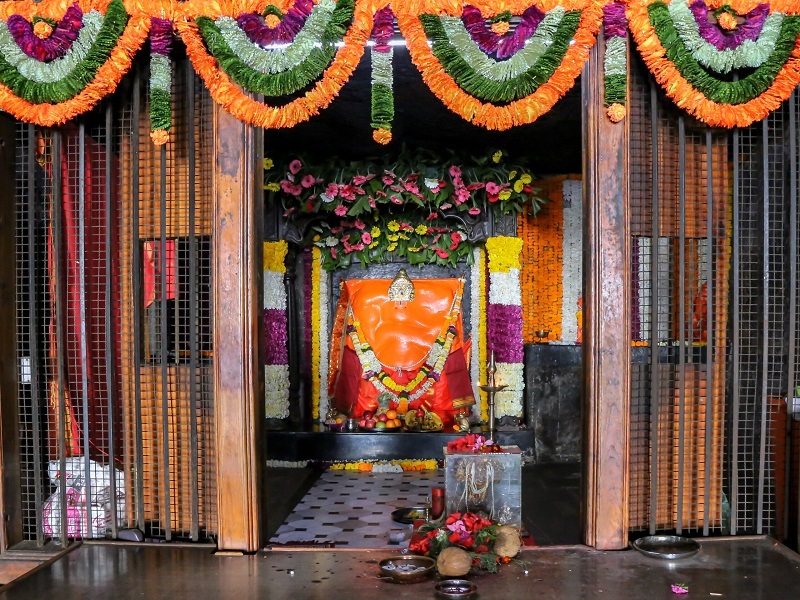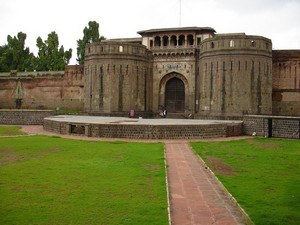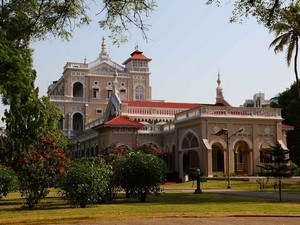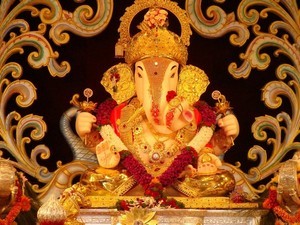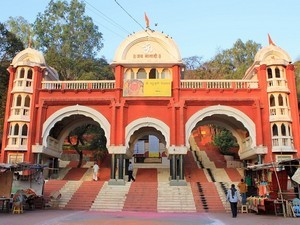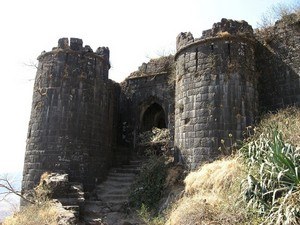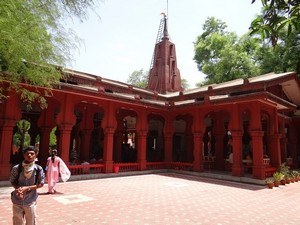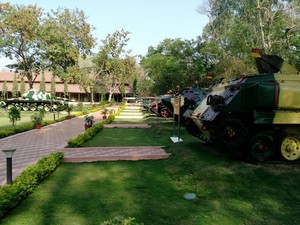Girijatmaj Lenyadri Ganpati Temple, Pune - Timings, Festivals, History, Darshan, Pooja Timings
Photo Credit: Flickr
 India | Maharashtra | Pune
India | Maharashtra | Pune
 #65 of 66 Places to Visit in Pune
#65 of 66 Places to Visit in Pune
 Distance (From Pune): 100 Kms
Distance (From Pune): 100 Kms
 Trip Duration (Including Travel): Full Day
Trip Duration (Including Travel): Full Day
 Transportation Options: Bus / Cab
Transportation Options: Bus / Cab
 Travel Tips: None
Travel Tips: None
About Lenyadri Girijatmaj Temple
At a distance of 100 Km from Pune & 193 Km from Mumbai, Girijatmaj Temple is a Hindu temple situated at Junnar in the Pune district of Maharashtra. Also known as Lenyadri Ganpati Temple, it is dedicated to Lord Ganesha, the elephant-headed god of wisdom. Lenyadri is one of the eight revered Ganesha temples collectively called Ashtavinayaka Temples while the other Ashtavinayak Temples in Maharashtra being Moreshwar in Morgaon, Ballaleshwar in Pali, Maha Ganapati Temple in Ranjangaon, Varadavinayak in Mahad, Siddhivinayak in Siddhatek, Chintamani in Theur, and Vighneshwar in Ozar. Lenyadri Ganpati Temple is the sixth temple to be visited as per the traditional sequence of the Ashtavinayak Yatra, and among the most sacred pilgrimage sites near Pune. Out of 18 Buddhist caves on mountain, Girijatmaj Ganpati Temple is in the 8th cave. These caves are also known as Ganesh Gufa. Located at Lekhan Hills, or Lenyadri Hills, Girijatmaj Temple is the only temple of the Ashtavinayak which is on a mountain and is built in the locale of Buddhist Cave Temples.
History of Lenyadri Girijatmaj Temple
Lenyadri, also known as Ganesh Lena or the Ganesh Pahar Caves, comprises approximately 30 rock-cut Buddhist caves carved into a natural cliff or steep incline. These caves, which date back to between the 1st and 3rd centuries AD, are associated with the Hinayana Buddhism tradition, although some have been later modified for Hindu practices. Twenty-six of the caves are assigned individual numbers, facing south and arranged sequentially from east to west. Among them, caves 6 and 14 serve as chaitya-grihas (chapels), while the remaining caves function as viharas (monastic dwellings). Notably, two central cells in Cave 7, originally designed as a Buddhist vihara, were repurposed for the worship of the Hindu deity Ganesha. This Ganesha Lena vihara is recognized as one of the Ashtavinayak shrines, a collection of eight significant Ganesha shrines located in Maharashtra.
Mythology of Lenyadri Girijatmaj Temple
According to legend, this is believed to be the site where Goddess Parvati engaged in meditation for twelve years in hopes of having a child. Satisfied with her devotion, Lord Ganesha granted her the blessing that he would be born as her son. Consequently, on the fourth lunar day of the bright fortnight in the Hindu month of Bhadrapada, known as Ganesh Chaturthi, Parvati worshipped a clay idol of Ganesha, which miraculously came to life. Thus, Ganesha was born to Parvati at Lenyadri, and later, he was named Gunesha by Lord Shiva. Shiva bestowed upon him the blessing that anyone who remembers Gunesha before commencing a task will achieve success in that endeavor. Gunesha spent fifteen years growing up in Lenyadri, which is why the temple is referred to as 'Girijatmaj'-'Girija' signifying Devi Parvati and 'Aatmaj' meaning son. The idol of Lord Ganesha at this temple in the Junnar Caves is believed to depict him in his infant form.
Architecture of Lenyadri Girijatmaj Temple
The architecture of the temple deviates from the conventional style of Hindu temples. The Lenyadri Ganesh Temple is hewn from a single stone hill and stands approximately 100 feet high. This cave, oriented towards the south, is exceptionally clean and well-preserved. Its architectural style resembles that of a Buddhist Vihara, featuring an unpillared hall that contains 20 cells of varying sizes. The hall measures 53 feet in length, 51 feet in width, and 7 feet in height, accessible through a central entrance beneath a pillared veranda. Two windows flank the entrance on either side. Currently, the hall serves as the sabha mandapa (assembly hall) for the Ganesha temple.
Like all Ashtavinayaka temples, the central image of Ganesha is regarded as self-manifested, formed naturally from stone to resemble an elephant's face. The idol of Lord Ganesha, carved into the back wall of the cave, faces east. Previously, the idol was adorned with armor, but now it is visible with its trunk turned to the left and one eye discernible. The icon is also covered in sindoor, consistent with the tradition of other Ashtavinayak temples.
Given its location within Buddhist caves, the approach to the temple involves a steep ascent, requiring visitors to climb over 300 steps.
Festivals of Lenyadri Girijatmaj Temple
Ganesh Chaturthi, which takes place in August or September, is observed with quiet pomp and glory at the Lenyadri Ganpati Temple. This festival, celebrated during the month of Bhadrapada, features elaborate decorations and numerous religious ceremonies. Many devotees visit the temple to honor Lord Ganesha during this period. Another important celebration is Maghi Chaturthi, held in January or February which commemorates the rebirth of Lord Ganesha. Furthermore, the temple also celebrates Holi and Dussehra with considerable fervor.
Dress Code & Other Restrictions of Lenyadri Girijatmaj Temple
Girijatmaj Temple in Junnar does not enforce a strict dress code; however, it is advisable to wear modest attire that covers the upper arms and legs as a mark of respect. Men are encouraged to don a dhoti or pajama along with an appropriate upper garment, or to wear formal trousers and shirts. Women may choose to wear a saree, half saree, or chudidhars. It is recommended to avoid modern clothing such as mini-skirts, shorts, and sleeveless tops while visiting the temple.
The Lenyadri temple does not impose a specific restriction on non-Hindus visiting. Nevertheless, it is essential to acknowledge that the temple is a holy site, and non-Hindus are expected to demonstrate respect for the religious customs and traditions associated with Hinduism.
Lenyadri Girijatmaj Temple Timings
Monday: 5 AM - 8 PM (Last entry: 6:30 PM)
Tuesday: 5 AM - 8 PM (Last entry: 6:30 PM)
Wednesday: 5 AM - 8 PM (Last entry: 6:30 PM)
Thursday: 5 AM - 8 PM (Last entry: 6:30 PM)
Friday: 5 AM - 8 PM (Last entry: 6:30 PM)
Saturday: 5 AM - 8 PM (Last entry: 6:30 PM)
Sunday: 5 AM - 8 PM (Last entry: 6:30 PM)
Lenyadri Girijatmaj Temple Entry Fee
Entry is available for Rs. 25 per Person
Parking is available for Rs. 20 - Rs. 50
Doli is Available for Rs. 1000 per Person
Best Time to Visit Lenyadri Girijatmaj Temple
The most favorable time to visit Lenyadri Girijatmaj Temple is from October to February, when the weather is enjoyable and suitable for exploring the temple. The rainy season poses challenges for travel and sightseeing. Nevertheless, the significant festival of Ganesh Chaturthi occurs during the rainy month of Bhadrapada in the Hindu calendar (August/September), featuring elaborate religious celebrations. Furthermore, it is advisable to refrain from visiting the temple in the summer months because of the intense heat.
How to Reach Lenyadri Girijatmaj Temple
Pune International Airport, situated about 96 kilometers from Junnar, is the nearest airport and provides flights to a wide array of prominent international destinations, such as Dubai, Thailand, Malaysia, Singapore, the USA, Europe, and Sri Lanka. It also connects to various domestic cities, including Mumbai, Hyderabad, Bangalore, Chennai, Delhi, Jaipur, Kochi, Trivandrum, Kolkata, and Goa. Additionally, Pune Junction Railway Station, located approximately 101 kilometers from Junnar, offers train services to all major cities across India, including Mumbai, Delhi, Kolkata, Chennai, Hyderabad, and Bangalore. Travelers can reach Junnar by bus or taxi from Pune, Thane, and Mumbai. From the Junnar Bus Stand, visitors can hire an auto-rickshaw or cab to access the Lenyadri Ganapati Temple. To reach the Lenyadri Ganapati Cave from the base of the hill, one must climb around 300 stone steps, or one can opt for a doli service which is available at the base, with a fee of 1000/- per person.



